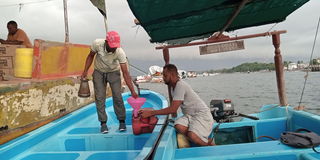Fuel floating stations here to stay, Lamu residents told

A boat operator fueling at one of the Lamu floating filling stations
Traders dealing in petroleum products on Lamu Island have been warned against selling the commodity secretly.
In 2014, the county government directed dealers in petrol and gas to move their businesses from Lamu town into the middle of the Indian Ocean channel, where they would operate atop boats or move further to the mainland areas.
Fire tragedies had by then increased in shops selling petrol and gas, prompting the county administration to take the drastic measure.
Nine years down the line, the move has proved to be an effective guard against fires across Lamu Island.
However, some dealers have been secretly selling petrol packaged in bottles in some kiosks in Lamu town.
Speaking to Nation.Africa, Lamu Municipality Manager Omar Famau stressed that the ban on petrol selling in Old Town is still in place and that there is no plan to move the floating fuel stations from the Indian Ocean to the mainland.
Mr Famau said those involved in the business were doing so illegally and they should stop.
All the five petrol stations in Old Town are floating petrol stations located on the Indian Ocean.
There is no fuel station on the island.
“We have no plan to bring back petrol stations to the island. The transfer of those petrol stations to the Indian Ocean has fully cushioned the town against fuel-related accidents and fires among other tragedies. If there are people selling petrol secretly, (they should remember) it is prohibited,” said Mr Famau.
He said his office will organise sensitization campaigns for locals on the importance of having petrol stations situated on the ocean rather than on land in the town.
“People are living without any worry of fire outbreaks because all the petrol dealers have been operating their businesses on the Indian
Ocean far from peoples’ residential places. We shall continue sensitising the residents concerning this issue. It’s for their own good,” he said.
Abzein Alawi, an elder in Lamu town, noted that gas and petrol businesses previously posed a threat to the security and general well-being of island residents.
He said there were fire cases on a weekly or monthly basis.
“But since they were moved, there has been no case,” he said.
Fatma Shee said it is difficult to manage fire-related tragedies on Lamu Island as there is no firefighting station.
Boat operators who were interviewed by the Nation in Lamu town said they were happy to have petrol stations located in the Indian Ocean.
Mohamed Bini, a renowned coxswain in Lamu town, said it is easier for them to fuel their boats while in the Ocean.
“There is no need for you to anchor your boat somewhere so as to look for petrol on Lamu Island or in the mainland. Moving the fuel stations to the ocean eased our operations as coxswains,” Mr Bini said.
Mr Abdallah Faraj, a coxswain, called for more floating petrol stations to be set up along their routes.
But some boda boda operators expressed frustrations as they have to hire boats to access the floating fuel stations.
“They should at least have one petrol station operating on land just for our convenience,” Mr Ahmed Araphat said.





